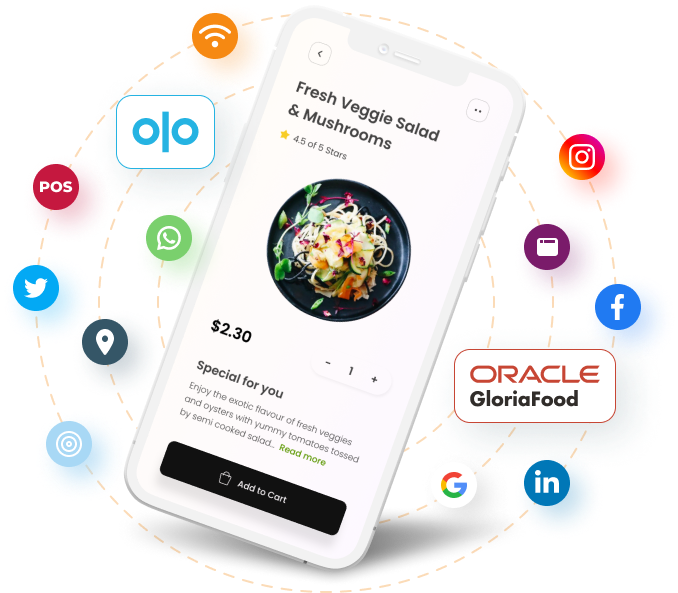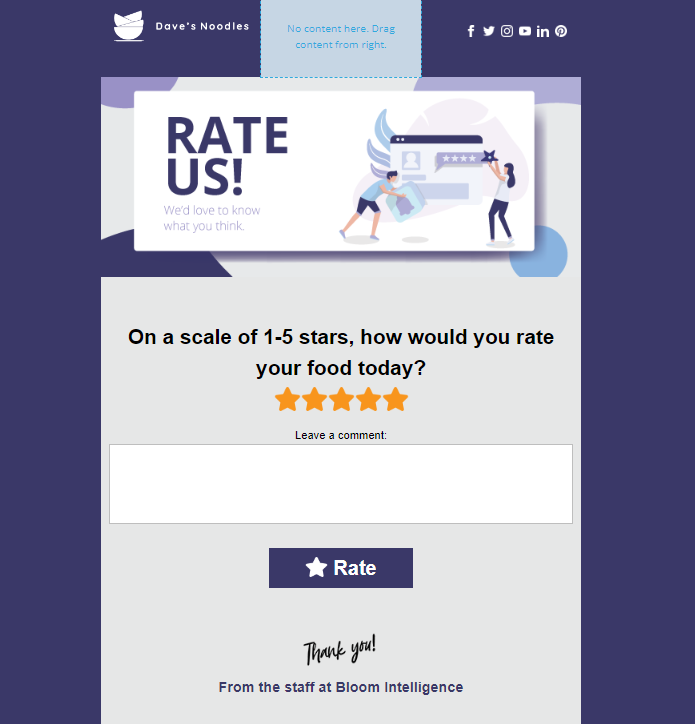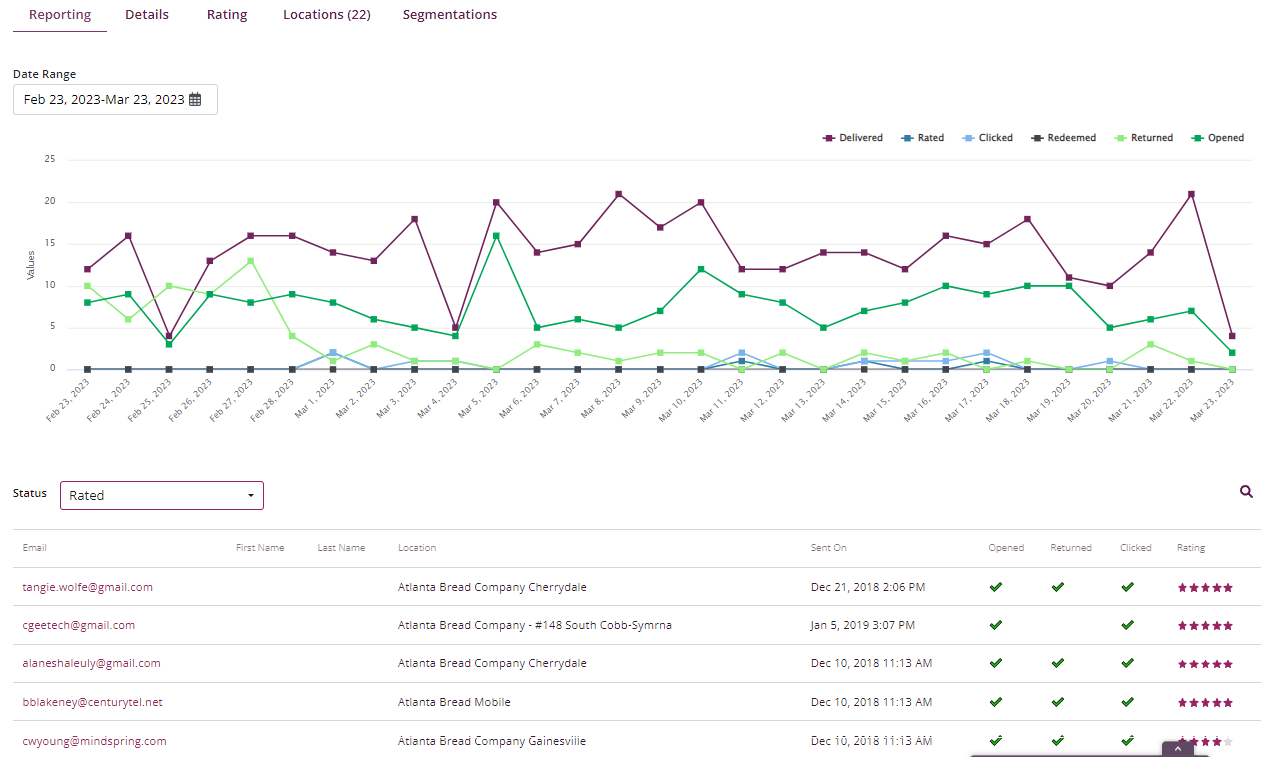Restaurant Surveys
Restaurant Survey Questions and Examples to Help Grow Your Business and Improve Guest Experience and Lifetime Values

Scroll to explore
Restaurant Surveys
A restaurant survey is a valuable tool designed to gather feedback from guests on various aspects of their dining experience, enabling restaurant owners and operators to assess and improve their offerings and services.
These surveys encompass a range of topics, including food quality, service, ambiance, pricing, and overall satisfaction, thereby providing a comprehensive understanding of guest perception, sentiment, and expectations.
By offering a platform for patrons to voice their opinions, restaurant surveys empower restaurants to identify areas of excellence and address any shortcomings, ultimately leading to a more successful and customer-centric establishment.
In today’s increasingly competitive marketplace, understanding the preferences and desires of consumers is essential for growth and sustainability. And knowing those of your very own guests can be priceless.
Restaurant surveys enable you to stay in tune with the ever-evolving needs and tastes of your ideal guests, helping to create tailored restaurant marketing and operations to maintain guest loyalty and attract new guests.
Furthermore, they provide essential guest insights that can be leveraged for staff training, menu development, pricing adjustments, and interior modifications for ambiance.
A well-crafted survey should be easy to understand, concise, and engaging to encourage maximum participation.

Typically, restaurant surveys are conducted in various formats, such as in-person questionnaires, online forms, or through third-party review platforms.
Bloom Intelligence allows restaurants to easily send first-party survey questions to their restaurant guests using its built-in marketing automation capability.
Once set up, the surveys are sent out automatically to guests after they have visited your establishment or ordered online.
Any survey question can be asked, and guests have the ability to rate the question on a scale of 1-5 stars and provide any comment they wish.
Results are easily seen and monitored in the easy-to-use reporting feature.

Moreover, the data collected from restaurant surveys can be analyzed using quantitative and qualitative methods to identify trends, patterns, and areas of improvement.
This first-party data not only helps businesses make informed decisions but also allows them to benchmark performance against industry standards and competitors.
Ultimately, by harnessing the power of guest feedback through restaurant surveys, businesses can foster a culture of continuous improvement, driving excellence in all aspects of their operation and ensuring a memorable and enjoyable dining experience for all guests – whether visiting or ordering online.
Benefits of Using Restaurant Surveys
Restaurant surveys have become an integral part of the hospitality industry, allowing guests to provide feedback on their dining experience and giving restaurant owners an opportunity to improve their offerings, service, and guest experience.
Here are a few ways that restaurants – and their guests – can benefit from providing guest surveys.
Improved Guest Experience
One of the primary benefits of restaurant surveys is that they provide guests with an avenue to voice their opinions and concerns about their dining experience.
By giving feedback on the quality of food, service, ambiance, online ordering, and overall experience, guests can help restaurant owners identify areas where they need to improve.
This feedback is critical for restaurants looking to maintain guest satisfaction and loyalty.
When restaurant owners receive feedback from patrons, they can take data-driven steps to improve the guest experience. For example, if guests consistently complain about slow service, restaurant owners can hire additional staff or train their existing staff to improve their efficiency.
Similarly, if guests complain about the quality of the food, restaurant owners can adjust their recipes or source higher-quality ingredients to improve the taste and presentation of their dishes.
By addressing these issues, restaurant owners can provide a better overall experience, leading to increased guest satisfaction, loyalty, and repeat business.
Enhanced Guest Loyalty
When guests feel like their opinions matter, they are more likely to return to a restaurant. By responding to feedback and making changes based on customer input, restaurant owners can build stronger relationships with their guests.
Consumers appreciate businesses that value their opinions and are willing to make changes based on their feedback.
In fact, according to a study by Oracle Hospitality, 75% of guests are more likely to return to a restaurant if their feedback is acknowledged and acted upon.
This highlights the importance of guest feedback in building enhanced customer loyalty.

Increased Revenue
Positive feedback on restaurant surveys can attract new guests to the restaurant. Guests who have had a positive experience are more likely to recommend the restaurant to others, resulting in increased revenue for the business.
In fact, according to a study by Yelp, restaurants with a 4-star rating or higher on their platform see an average increase in revenue of 19%.
Moreover, restaurant surveys can also help restaurant owners identify opportunities for revenue growth.
For example, if guests consistently mention that they would like to see a certain type of cuisine or menu item, restaurant owners can adjust their offerings to meet customer demand and potentially attract new guests.
Competitive Advantage
Restaurants that prioritize guest feedback and use it to improve their business have a clear competitive advantage over those that don’t.
Restaurants that prioritize guest feedback are more likely to attract and retain customers.
Plus, by addressing guest concerns and making changes based on their feedback, restaurant owners can further differentiate themselves from their competitors.
This can help them stand out in today’s crowded and competitive market and attract new guests who are looking for a unique dining experience.
Insight into Guest Preferences
Restaurant surveys can provide valuable insights into guest preferences, such as favorite menu items, preferred dining times, and dietary restrictions.
This information can be used to tailor the restaurant’s offerings to better meet the needs of its customers.
For example, if guests consistently mention that they prefer vegetarian or vegan options, restaurant owners can add more vegetarian or vegan dishes to their menus.
Similarly, if guests mention that they prefer a certain type of cuisine or a specific type of wine, for example, restaurant owners can adjust their offerings to better meet customer demand.
By catering to known guest preferences, restaurant owners can enhance the customer experience, increasing guest satisfaction and loyalty.
Restaurant Survey Questions
An effective restaurant survey is instrumental in obtaining valuable insights from guests that can drive improvement and success in today’s marketplace.
Crafting the best survey questions is essential to gaining actionable feedback and understanding various aspects of the dining experience.
Here are some of the most important restaurant survey questions to ask, covering topics such as food quality, service, ambiance, and overall guest satisfaction.
By incorporating these carefully chosen questions into your surveys, you can gain a comprehensive understanding of your guests’ perceptions, preferences, and expectations, ultimately empowering your restaurant business to grow and thrive.
- How did you discover our restaurant? Knowing how a guest found your restaurant is important because it provides valuable information about the effectiveness of your marketing efforts and overall reputation. By tracking how guests found your restaurant, you can determine which marketing channels are most effective in driving business.
- Age and Gender. Understanding the age and gender of restaurant guests is important because it provides valuable information for marketing and menu development. By analyzing demographic data, restaurant owners can identify trends and preferences among different guest segments.
- How often do you visit? How often restaurant guests visit is important because it provides insight into customer loyalty and the success of marketing efforts. By tracking guest visit frequency, restaurant owners can identify trends and patterns in customer behavior. This information can help them understand which marketing efforts are most effective in attracting repeat business and retaining loyal customers.
- Do you order online? How Often? By tracking guest online order frequency, restaurant owners can identify trends and patterns in customer behavior. This information can help them understand the demand for online ordering and how to optimize their online ordering system to improve the guest experience. Moreover, tracking guest online order frequency can help restaurants personalize the online ordering experience for their most frequent customers.
- Did you have to wait to be seated? How long?Knowing if restaurant guests had to wait to be seated is important because it provides insight into the effectiveness of the restaurant’s seating management and overall customer experience. By tracking wait times, restaurant owners can identify bottlenecks and inefficiencies in the seating process, allowing them to optimize their operations and improve the overall customer experience.
- How would you rate the food today? How restaurant guests rate the food is important because it provides critical feedback for restaurant owners to improve the quality of their offerings. By tracking guest ratings, restaurant owners can identify areas where the food can be improved, whether it be the taste, presentation, or overall quality. Moreover, guest ratings can help restaurants personalize the dining experience for their guests. For example, if guests frequently leave a positive review for a specific dish, the restaurant might consider promoting that dish or incorporating similar flavors into other menu items.
- How quickly was your food served? Learning how quickly food is served is important because it provides valuable information about the efficiency of the restaurant’s kitchen and overall customer experience. By tracking the time it takes to serve food, restaurant owners can identify bottlenecks and inefficiencies in the kitchen, allowing them to optimize their operations and improve the overall customer experience.
- How would you rate the cleanliness of our restaurant? The cleanliness of a restaurant is important because it provides critical feedback on the overall sanitation and hygiene of the establishment. Cleanliness is a crucial aspect of the dining experience and can greatly impact customer satisfaction and loyalty. By tracking guest feedback on the cleanliness of the restaurant, owners can identify areas that need improvement and take corrective action to maintain high standards of cleanliness and hygiene.
- How likely are you to visit us again or order online? By tracking guest feedback on their likelihood of returning, restaurant owners can identify areas that need improvement and take corrective action to maintain high standards of service and overall dining experience. Overall, knowing if guests will visit your restaurant again is important for maintaining customer loyalty, identifying opportunities for improvement, and developing targeted strategies that encourage repeat business.
- Would you recommend us to family/friends? Knowing if guests would recommend your restaurant is important because it provides valuable feedback on customer satisfaction and the overall reputation of the establishment. By tracking guest feedback on their likelihood of recommending the restaurant to others, restaurant owners can identify areas that need improvement and take corrective action to maintain high standards of service and overall dining experience.
- Was the music/tv volume to your liking?
It is important to know if restaurant guests enjoyed the music volume in the dining room, as it contributes significantly to the overall dining experience. Music volume plays a crucial role in creating the desired atmosphere. The right volume can set the mood, making guests feel comfortable and relaxed, while inappropriate volume levels may detract from the dining experience, leading to discomfort and dissatisfaction. Ensuring that guests enjoy the music volume contributes to their overall satisfaction with the dining experience.
- Were you pleased with our drink offerings? Drink offerings also play an important part in the overall dining experience. Satisfied customers are more likely to return, recommend the restaurant to others, and leave positive reviews, which can boost a restaurant’s reputation and attract new customers. By understanding which drinks are popular and which may need improvement, restaurant owners and managers can make informed decisions about their beverage menu. This can lead to the introduction of new, innovative drinks or adjustments to existing offerings, ensuring that the menu remains appealing and relevant to guests’ preferences.
- Were the hosts and wait staff friendly and accommodating? It is important to know if restaurant hosts and wait staff were friendly and accommodating because their demeanor and service directly impact the overall dining experience and guest satisfaction. This is crucial for ensuring guest satisfaction, maintaining service quality, fostering loyalty, resolving conflicts, improving staff morale, and gaining a competitive advantage.
- Did you use a discount or special offer today? Knowing if restaurant guests used a discount or special offer is essential for assessing marketing and promotional effectiveness, improving guest acquisition and retention, analyzing revenue, refining marketing and advertising strategies, enhancing guest satisfaction, identifying operational issues, and encouraging even more valuable guest feedback.
- Did your drinks and food come out as ordered? Food and drinks coming out as ordered is important because accurate order fulfillment directly impacts guest satisfaction, restaurant reputation, and overall business performance. Likewise, it is crucial to ensure service quality, minimize waste and costs, improve operational efficiency, accommodate allergies and dietary restrictions, and provide more timely service.
- What did you think of the menu options? Knowing what guests think about menu options is crucial for enhancing guest satisfaction, optimizing the menu, catering to diverse preferences, identifying trends, managing costs and waste, informing marketing efforts, and creating a personalized dining experience. This valuable feedback can help restaurants continually evolve and adapt to better serve their guests, leading to the success and longevity of their business.
- Is the environment clean and welcoming? This feedback is essential for creating positive first impressions, maintaining health and safety standards, managing reputation, fostering employee satisfaction and productivity, retaining guests, and enhancing the overall dining experience.
- Were the menu items priced fairly? Knowing if menu items are priced fairly is crucial for competitive positioning, guest affordability, profitability, customer loyalty, menu optimization, and positive brand perception. By carefully considering pricing strategies, restaurants can strike the right balance between providing value to their guests and achieving financial success.
- Were the seats and tables comfortable? Understanding if the seats and tables in a restaurant are comfortable is also essential for ensuring guest satisfaction, encouraging longer stays, creating a pleasant atmosphere, promoting accessibility and inclusivity, generating word-of-mouth marketing, fostering employee satisfaction, and maintaining a positive brand perception. By prioritizing guest comfort, restaurants can enhance the overall dining experience and increase the likelihood of building a loyal customer base.
Tying It All Together
Restaurant surveys offer a multitude of benefits that are essential for any restaurant striving to excel in today’s competitive food service industry.
By gathering valuable guest feedback, restaurant surveys enable businesses to gain a deeper understanding of their patrons’ preferences, expectations, and areas of concern.
This invaluable information empowers restaurant owners and operators to make data-driven decisions that enhance various aspects of their operation, ranging from menu offerings to service quality, and ambiance.
Furthermore, restaurant surveys play a crucial role in fostering a more positive guest experience and improving guest loyalty and revenue.
By actively seeking and acting upon guest feedback, restaurants demonstrate their commitment to delivering exceptional dining experiences that cater to the evolving tastes and demands of their guests.
This proactive approach not only helps in retaining loyal guests but also attracts new ones, ultimately driving revenue growth to help ensure long-term success.
Ultimately, the benefits of using restaurant surveys cannot be overstated. These powerful tools provide a direct line of communication with guests, allowing restaurants to adapt, innovate, and thrive in an ever-changing marketplace.
By embracing the insights and opportunities presented by restaurant surveys, businesses can bolster their reputation and strengthen their brand.
Discover Bloom Intelligence
Bloom Intelligence can supercharge the power of your marketing and operations efforts.
Not only will you have massive amounts of guest data to help shape your operations, marketing, and branding, but you will also be able to segment your guest list and target specific restaurant survey messages to specific groups. And it’s all automated to help you save time and money.
Bloom Intelligence offers WiFi marketing and analytics solutions tailored to drive guest engagement while measuring ROI on every campaign.
This allows restaurateurs to optimize their marketing and operations over time, leading to higher guest satisfaction and customer lifetime values.
Repeat guests mean repeat profits. Start getting them today!
In today’s competitive environment, we can give you the competitive edge for success! Let us show you how.
- Call 727-877-8181
- Email us at sales@bloomintelligence.com
- Schedule a Demo
SAVE TIME, INCREASE CUSTOMER LIFETIME VALUES, CREATE NEW CUSTOMERS
What our happy customers
are saying
“SaaS that covered so many bases for us instead of having to use multiple software products. Bloom Intelligence has simplified our responses to reviews, customer feedback, and more. I highly recommend Bloom Intelligence.”
Robert Sanderson
“Bloom Intelligence really is a step ahead in terms of marketing software and metrics. Their product is reliable, fast and innovative and has helped the company I work for really grow.”
John Marchetti
“Working with Bloom Intelligence has been amazing. They assist you every step of the way and work with you hand in hand to make sure you are optimizing your advertising potential. We are excited to use this tool to help learn more about our customers so that we can personally engage with them and understand our strengths/weaknesses.”
Ariel Ramirez
“In these challenging times, it has been a pleasure working with Bloom Intelligence to help facilitate our service offering to our clients. They were extremely responsive and provided support to mitigate risk and minimize revenue loss. Great partner!”
Stefan Kim
“We’re extremely pleased with the wealth of customer data that we’re able to gather, at a very attractive price. In addition, we’re able to communicate our new product promotions by using the landing page as a digital billboard. A “no-brainer” for anyone working with limited Marketing $$.”
Bob Cross, Vice President of Operations
Bloom CRM Database FAQs
What Does CRM Stand For?
CRM stands for Customer Relationship Management database. To summarize, a CRM database is a collection of guest data grouped into customer profiles. So, a CRM can be used to understand your customer base, and for segmented, targeted marketing campaigns that can be tracked for accurate attribution.
What is a CRM Database?
A CRM Database is a digital collection of individual guest information grouped into customer profiles. Likewise, the database consists of detailed guest data such as names, behavior data, demographics, addresses, zip codes, emails, and phone numbers. As a result, these profiles are used to track communication and to remarket to guests.
What are Examples of a CRM Database?
An example of a CRM database for offline companies is the Bloom Intelligence CRM database. For example, using guest WiFi access points & guest WiFi landing pages, the platform collects guest behavior data, whether they log into WiFi or not, and builds detailed customer profiles for marketing and attribution. By comparison, other popular CRM’s include Salesforce, Microsoft Dynamic, and Hubspot.
How Do I Create a CRM Database?
For restaurant and retail locations, the easiest and best way to create a CRM database is to use your WiFi access points, Guest WiFi landing page, website widgets, and API’s to collect guest information and behavior data. Then, once configured, your guest data is collected and cleaned automatically.
The Power Restaurant Online Ordering Marketing

Optimize retail &
business operations

Track attribution of
customer campaigns

Trigger marketing
campaigns based on
marketing presence

Measure the health
of corporate & franchisee
locations

Compare locations or
group of locations to
quickly identify opportunities
or threats
Are you ready to grow
your business with
restaurant online ordering
marketing and WiFi
marketing automation?
If so, find out how Bloom Intelligence’s WiFi analytics
& marketing platform measures offline guest
behavior and builds guest loyalty.
So, it’s time to start leveraging your guest WiFi to gain
a competitive edge. Then watch your profits grow.




